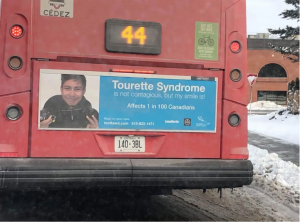CBC Radio interview with Jill Bobula and the Three Youths behind the 2020 OCTranspo Ad Campaign
Ottawa
Tourette campaign shows syndrome’s younger face
Social Sharing
OC Transpo bus ads highlight children who live with tics
Laura Glowacki · CBC News · Posted: Jan 30, 2020 4:00 AM ET | Last Updated: January 30

Amelia Watson, 8, is part of an advertisement campaign on OC Transpo buses in Ottawa to raise awareness of Tourette Syndrome. (Laura Glowacki/CBC)
Dressed in a bright pink parka and holding a hockey stick, Amelia Watson scrunches up her face and squeezes her eyes shut.
“It just happens,” the eight-year-old says. “Sometimes I try to hold it, but one of the best things is just to do it.”
The tic appears when Amelia is excited, tired or stressed. For many children with Tourette syndrome, including this outgoing and playful girl, that’s nearly all the time.
There is no cure for Tourette’s. The only cure is awareness.
– Erin McEwen, Amelia Watson’s mom
Amelia, along with Richard Martyn and Nicholas Lapage, volunteered to be photographed for a new campaign to raise awareness about their condition.
The ads have been on OC Transpo buses since December, and will stay there until the spring.
Amelia’s mom, Erin McEwen, said her daughter was proud to be part of the Tourette Canada campaign.
“There is no cure for Tourette’s. The only cure is awareness,” McEwen said.

Richard Martyn, 14, is one of the three children featured in a Tourette Canada bus campaign in Ottawa. (supplied)
Syndrome remains a mystery
Tourette syndrome is characterized by involuntary movements and vocalizations known as tics. It affects about one in 100 Canadians, according Tourette Canada.
Amelia lives with several tics. She scrunches her nose, tilts her head toward her shoulder and flaps her right arm, almost like a chicken wing.
“It makes me unique,” Amelia says with a smile.
Tourette awareness campaign featuring three Ottawa kids aims to fight stigma.
Nicholas Lapage, 14, is one of the children taking part in the Tourette syndrome awareness campaign. Jill Bobula, president of the Ottawa chapter of Tourette Canada, says the bus advertisements are aimed at fighting stigma. 0:48
Doctors still don’t know what causes Tourette syndrome. It often shows up in children ages four or five, and affects boys more than girls. Most people with Tourette syndrome don’t have any kind of cognitive impairment.
Common tics include eye-rolling, blinking, throat-clearing, grimacing and involuntary shoulder movements. Uttering obscene words, or coprolalia, affects fewer than one in 10 people with Tourette syndrome, according to Tourette Canada.
In the absence of a cure, advocates say one way to help people with Tourette is to destigmatize their tics so they feel less self-conscious about something they can’t control.
‘They bear the brunt of our ignorance’
Jill Bobula, president of Ottawa chapter of Tourette Canada, volunteers in schools with students who have Tourette to educate their classmates and teachers about the condition. For the kids with Tourette, those presentations can help head off personal questions or rude comments, Bobula said.
The bus campaign has the same goal, but on a much larger scale.

Nicholas Lapage, 14 is one of the children taking part in the Tourette syndrome awareness campaign. (Laura Glowacki/CBC)
For people with Tourette syndrome, the consequences of bullying, teasing and mocking can be severe and long-lasting, Bobula said.
“They stay in their homes, they don’t want to come out, they don’t want to participate in activities or events,” she said. “They bear the brunt of our ignorance.”
Nicholas Lapage is all too familiar with the cruelty people with Tourette syndrome can face.
The 14-year-old, currently in Grade 8, takes a special form of talk therapy called comprehensive behavioural intervention for tics, or CBIT, to help manage the condition.
‘I move forward’
Lapage talks openly about his tics: they’re a part of who he is, but they don’t define him.
“I had hard times, but that was the past and now I move forward,” he said mater-of-factly. “If you let Tourette’s get to your heart and to your brain, it will take control of you and it will get to you.”
One of the ways he copes is by continuing to do the things he loves, like skidooing with his dad or playing hockey. When he’s in the moment, the tics don’t appear — or at least he doesn’t notice them.
Richard Martyn, also 14, said he’s also felt ostracized for having Tourette syndrome. But he said it made a big difference when his friends began learning more about his tics.
“I was kind of ashamed of it, but after we had people come into the school and [talk] about Tourette’s and what it is, everyone was understanding and the bullying kind of dropped.”
Related Stories
- What it takes to find a job when you have Tourette syndrome